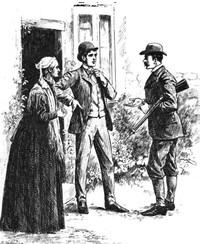|
|
Read this ebook for free! No credit card needed, absolutely nothing to pay.Words: 138691 in 63 pages
This is an ebook sharing website. You can read the uploaded ebooks for free here. No credit cards needed, nothing to pay. If you want to own a digital copy of the ebook, or want to read offline with your favorite ebook-reader, then you can choose to buy and download the ebook.

: The Firebrand by Crockett S R Samuel Rutherford - Spain History Carlist War 1833-1840 Fiction@FreeBooksWed 07 Jun, 2023 Editor: James E. Heath THE SOUTHERN LITERARY MESSENGER: DEVOTED TO EVERY DEPARTMENT OF LITERATURE AND THE FINE ARTS. RICHMOND: T. W. WHITE, PUBLISHER AND PROPRIETOR. 1834-5. SOUTHERN LITERARY MESSENGER. The inutility of these exclusive stipulations was soon proved; for in 1751 Tripoli became involved in difficulties with Great Britain, from circumstances similar to those which had provoked the ire of France. The quarrel terminated in a similar manner; a fleet was sent, and a treaty dictated, less humiliating in style to the weaker and less arrogant on the part of the stronger, than that with France, but giving to Great Britain in effect, all the exclusive or superior advantages, and to her consul the same precedence of all other consuls, which had already been solemnly guarantied to the French. As a matter of course the latter sent a squadron soon after, to require a renewal of the treaty of 1729 with stipulations still more in their favor, to which of course the Pasha consented. The same plan has been pursued by these two great nations, with regard to the other states of Barbary; and the court of each Bey, Pasha or Emperor, has been a perpetual theatre for the intrigues and struggles for influence of their consuls. In the early treaties with these states, we see no provision against piracy in general, no protest against the principle;--Tripoline cruisers shall not make prizes of our vessels, nor appear within a certain distance of our coasts--thus much they say; but nothing else appears, from which it might be gathered, that Tripoli was other than a state, respectable itself and complying with those evident duties, which compose the body of national morals. In fact Great Britain and France, each keeping a large naval force in the Mediterranean, which could immediately chastise any offence against its own commerce, not only had no objection to the practice of piracy, but even secretly encouraged it; as the vessels of the weaker states were thus almost excluded from competition in trade. The abandonment of this despicable policy is one among the many triumphs of principle and feeling, which have marked the advance of civilization during the last twenty years, and which authorize us in hoping that a desire to promote the general welfare of mankind, may in future exert an influence in the councils of statesmen. After the death of Hamet the Great, the usual dissensions as to who should succeed him, for sometime distracted the country; his second son Mohammed at length established his claim, and with singular magnanimity, permitted seven of his brothers to live through his reign, which ended with his life in 1762. Ali, the son and successor of Mohammed, was not so indulgent, and accordingly his uncles were soon despatched. One of them, a child, was however believed to have escaped, and a man was for many years supported at Tunis, whom the politic sovereign of that country affected to consider as the prince. The pretensions of this person were even favored by the Sultan, who, ever desirous of re-establishing his power over Tripoli, adopted this means of keeping the country in a ferment, and the Pasha in alarm. However, after this first bloody measure, which is considered as a mere act of prudence in the East, Ali passed his reign, not only without any show of cruelty, but actually exhibiting in many cases a degree of culpable kindness. He seems indeed to have been a weak and really amiable man, possessing many negative virtues, and even a few positive; among the latter of which, were constancy and real attachment for his family. He had but one wife, who doubtless merited the devoted respect with which he always treated her; and when we read the details of their family life, as recorded in the agreeable pages of Mrs. Tully, it is difficult to imagine that such scenes could have taken place within the bloodstained walls of the castle of Tripoli. But if Ali received pleasure and consolation from his faithful Lilla Halluma, the mutual hatred of their three sons rendered the greater part of his existence a horrible burden. Hassan, the eldest of the princes, was a man of much energy, together with a considerable share of generosity and good feeling. He was at an early age invested by his father with the title of Bey, which implies an acknowledgement of his right to succeed to the throne, and moreover gives him the command of the forces, the only effectual means of substantiating that right. In this office he soon distinguished himself during many expeditions which he commanded against various refractory tribes; and under his administration, the army and the revenues of the country began to recover from the miserable state in which the supineness of his father had permitted them to languish. Indeed, upon the whole, he gave promise of as much good with as little alloy, as could possibly have been expected in a sovereign of Tripoli. Hamet, the second son of the Pasha, inherited the weakness of his father, without his better qualities, and exhibited throughout life the utmost want of decision; in prosperity ever stupidly insolent; in adversity the most abject and degraded of beings, the slave of any one who was pleased to employ him. An improper message sent by the Bey to his wife, soon after their marriage, provoked a deadly hatred against his elder brother, which only exhibited itself however in idle vaporing threats of vengeance. The distracted parents did all in their power to produce a reconciliation, but in vain; the Bey was haughty, and Hamet implacable; neither trusting himself in the presence of the other, unless armed to the teeth and environed by guards. Yusuf, the youngest son, was the reverse of Hamet; brave, dashing and impetuous, he had scarcely reached his sixteenth year, before he openly declared his determination to struggle with the Bey for the future possession of the crown, or even to pluck it from the brow of his fond and tottering parent. Hassan at first regarded this as the mere ebullition of boyish feelings, and endeavored to attach him by acts of kindness; but they were thrown away on Yusuf, who apparently siding with Hamet, acquired over him an influence which rendered him a ready tool. The whole country was engaged in the dispute, and daily brawls between the adherents of the opposing parties rendered Tripoli almost uninhabitable. Free books android app tbrJar TBR JAR Read Free books online gutenberg More posts by @FreeBooks
: Mary Help of Christians and the Fourteen Saints Invoked as Holy Helpers Instructions Novenas and Prayers with Thoughts of the Saints for Every Day in the Year; To Which is Added an Appendix on the Reasonableness of Catholic Ceremonies and Practices by Ham@FreeBooksWed 07 Jun, 2023

: La femme du diable by Lafon Labatut Joseph Claretie Jules Author Of Introduction Etc Lafon Gabriel Contributor - Poetry FR Poésie@FreeBooksWed 07 Jun, 2023
|
Terms of Use Stock Market News! © gutenberg.org.in2025 All Rights reserved.






